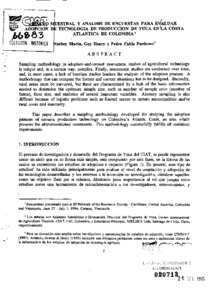Diseño muestral y análisis de encuestas para evaluar adopción de tecnología de producción de yuca en la Costa Atlántica de Colombia
Sampling methodology in adoption-and-impact assessment studies of agricultural technology is unique and, in a certain way, complex. Firstly, assessment studies are conducted over time, and, in most cases, a lack of baseline studies hinders the analysis of the adoption process. A methodology that can compare the former and current situations has to be designed. Secondly, rural areas must be surveyed, but these are characterized by a lack of the basic information needed to determine the optimum sample size, such as number of sample units (number of farms), farm size, and statistics of several important variables. Aleatory sampling is also difficult because of logistic problems such as limited access to certain municipalities and/or rural areas and insecurity. This paper describes a sampling methodology developed for studying the adoption patterns of cassava production technology on Colombia`s Atlantic Coast, an area which presents the abovementioned constraints. This methodology successfully fulfills all statistical requirements.

